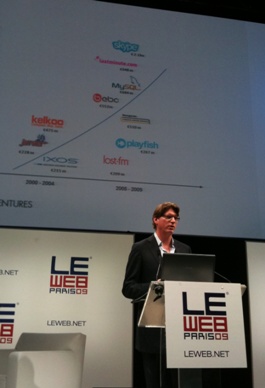 Niklas Zennström, half of the infamous duo that started companies like Kazaa, Skype, Joost and Rdio, took the stage at the Le Web conference this afternoon to talk innovation in Europe and the lessons he’s learned as a European entrepreneur for the last 9 years.
Niklas Zennström, half of the infamous duo that started companies like Kazaa, Skype, Joost and Rdio, took the stage at the Le Web conference this afternoon to talk innovation in Europe and the lessons he’s learned as a European entrepreneur for the last 9 years.
Zennström said he found it encouraging to find that so many European entrepreneurs and startups are busy building innovative things in Europe too, and that conferences and Le Web are a great way to bring everyone together.
He talked about his most successful venture to date, Skype, and also acknowledged that mistakes were made building other companies like Kazaa and Joost. Unsurprisingly, he regards those mistakes as valuable lessons rather than failures.
Zennström said being an entrepreneur is a lifestyle, and requires complete dedication. Real company builders should forget about spare time and hobbies, and prepare for a lot of sweat and hard work. On the other hand, he said, riding that wave can prove to be very rewarding.
The entrepreneur turned venture capitalist / entrepreneur left his job together with Janus Friis back in 2000, funnily enough on the same day NASDAQ peeked. P2P technology back then was regarded as the next big thing, like realtime at present, and something else in two years.
First lesson that he learned: to be successful in business, you have to believe. Sometimes, you’ll be the only one who believes, but you need to be strong and passionate in order to see things through.
Zennström and Friis saw Kazaa grow quickly in terms of users and installs, but they consider themselves now to have been ahead of the time. Zennström acknowledged that mistakes were made and opportunities missed, particularly in terms of working together with record companies for business development.
The vision for Skype came when the duo saw broadband getting critical mass, and that their technology would fit right in there. They knowingly went after a large industry they considered needed fixing, and figured if they could just take one percent they’d be successful, mainly because of the high margins in that industry.
Skype grew really quickly, but it was bootstrapped for a long time. In fact, Zennström said Skype had a lot of trouble getting interest from venture capitalists in Europe because of the risk involved, and mulled talking to VCs based in the United States. Ultimately, they stuck to Europe, also because it wouldn’t be a good idea for them to travel to the U.S. because of pending litigation from the Kazaa days.
Zennström said Skype was always a global company, and more European companies should be thinking that way, try to build distribution partnership across borders. They should make their own path and swim against the tide, he adds.
The Swedish entrepreneur also said there’s a misconception that Europe is bad at building very big companies, and that it’s mainly an issue in the high-tech and Internet sector. He referred to companies like Louis Vuitton and Ikea as counter-examples, and pointed out that most of these companies never took venture capital to grow.
Zennström said Europeans generally don’t have the right mindset for entrepreneurship, and that they are too risk averse. There’s also the issue of brain drain, European entrepreneurs moving to Silicon Valley, which he thinks will become less of a problem in the future. He also lamented the fact that European tend to stigmatize failure. Success, after all, is not a pre-defined formula.
Europe has other problems too, according to Zennström. Too complicated to set up companies, hire and fire people, and so on. The EU has so far been unable to adequately address that problem.
Zennström did say that he thinks the trends are changing now, and that more success will come. He praises conferences such as Le Web, the fact that entrepreneurs are starting to connect more and come more agile and less averse to changing the business strategy if necessary, and that there are more role models for aspiring entrepreneurs.
In the end of his talk, Zennström said there’s no Silicon Valley in Europe, but that he’s convinced we do not need one either.